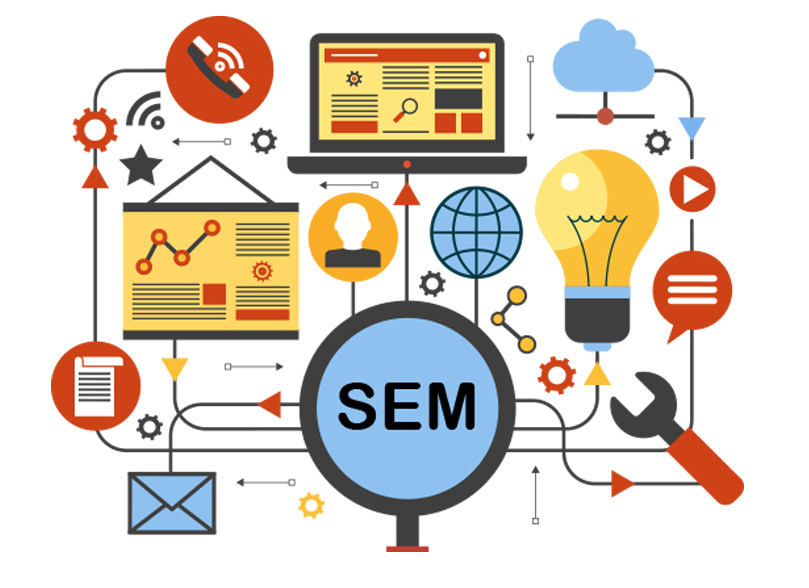SEM (Search Engine Marketing) Services are marketing strategies aimed at increasing a website‘s visibility and traffic through paid search engine advertising. SEM primarily involves the use of paid ads, but can also include other strategies for improving search engine rankings and increasing organic reach.

Key SEM services typically include:
1. Paid Search Advertising (PPC)
- Google Ads (AdWords): The most common form of SEM, Google Ads allows businesses to bid on specific keywords to appear at the top of search engine results pages (SERPs). Advertisers pay per click on their ad, hence the term Pay-Per-Click (PPC).
- Bing Ads: Similar to Google Ads, but through Microsoft’s Bing search engine.
- Shopping Ads: These are product listings that appear on search engines, such as Google Shopping ads, showing product images, prices, and the store name.
2. Keyword Research & Strategy
- Identifying the most relevant and profitable keywords for your business is a foundational part of SEM. Tools like Google Keyword Planner or SEMrush are used to find the right keywords that attract targeted traffic.
- Long-tail Keywords: These are highly specific phrases that tend to have lower competition but can attract highly relevant customers.
3. Ad Copy Creation and Optimization
- Crafting compelling and engaging ad copy is key to attracting clicks. A/B testing different ad texts helps determine which copy resonates best with the audience.
- Ad Extensions: Additional information such as phone numbers, locations, or additional links that enhance the appearance and effectiveness of the ads.
4. Landing Page Optimization
- Ensuring that the page users are directed to after clicking on an ad is optimized for conversions (i.e., turning visitors into customers). This includes optimizing for speed, relevance, clear calls-to-action, and a seamless user experience.
5. Bid Management
- Bid management services help optimize the amount a business is willing to pay for clicks on specific keywords. Services often involve setting up automated rules or manual adjustments to control costs while maximizing results.
6. Remarketing Campaigns
- Display Ads: Targeting users who have previously interacted with your website but didn’t convert. These users can see your ads while they browse other websites, reminding them of your product or service.
- Dynamic Remarketing: A more personalized form of remarketing where ads feature the specific products or services a user previously viewed.
7. Conversion Rate Optimization (CRO)
- SEM services may include conversion optimization to maximize the ROI from paid search campaigns. This involves analyzing landing page performance and improving the user experience to encourage more conversions.
8. Analytics and Reporting
- Using tools like Google Analytics or Google Search Console, SEM service providers track performance and analyze key metrics such as click-through rate (CTR), cost-per-click (CPC), return on ad spend (ROAS), and conversion rates.
- Regular reports are generated to inform clients about the effectiveness of the SEM campaigns and identify opportunities for improvement.
9. A/B Testing
- Testing different ad formats, landing pages, or bidding strategies to see what performs best and improve the overall effectiveness of the SEM campaign.
10. Competitor Analysis
- Understanding the competition in the search engine space is crucial. SEM service providers may perform competitor analysis to identify gaps in your strategy and opportunities for improvement.
Benefits of SEM Services:
- Immediate Results: Unlike SEO, which takes time, SEM can deliver immediate traffic and visibility.
- Highly Targeted: SEM allows targeting by location, device, language, and more, ensuring your ads reach the right audience.
- Scalability: SEM campaigns can be adjusted quickly, allowing you to scale your efforts based on budget and results.
- Measurable ROI: SEM campaigns provide measurable results, helping businesses track performance and adjust accordingly.
Popular SEM Platforms:
- Google Ads
- Bing Ads
- Yahoo Ads
- Facebook and Instagram Ads (Though primarily social media platforms, these offer search-like targeting options.)
- Amazon Advertising (For e-commerce businesses)
By using SEM, businesses can increase their online visibility, attract more qualified leads, and drive higher revenue, all while optimizing their marketing efforts for efficiency and profitability.